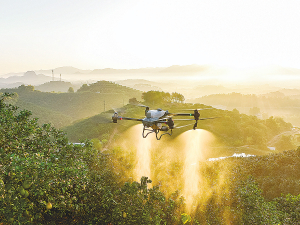Drones are gaining more popularity in the rural sector as users realise they offer the potential to improve productivity, health and safety and ultimately reduce costs.
Indeed, while drone use probably started out as taking photos and making videos from a different perspective, they have now moved into the realms of crop assessment, monitoring of remote areas and water lines and targeted weed or crop spraying.
Ferntech, the distributor for the well known DJI range, returns to Fieldays 2023, with several examples of what drone adoption has to offer. The DJI Agras T40 Spraying Drone is designed for precision spraying and spreading, allowing operators to accurately spot spray plants, reducing the cost of expensive chemicals, while eliminating costs such a diesel, with environmental benefits such as reduced emissions, no ground compaction or bank destabilisation. Equipped with a 40L tank capacity, the T40 can efficiently spread and spray over 120ha per day, flying across steep terrain, boundaries, and gullies in a fraction of the time and with zero risk.
For livestock farmers, the DJI Mavic 3 Enterprise Barking Drone, easily herds and move your livestock across large distances, by combining a loudspeaker with recorded audio, such as a dog’s bark or a siren, at the same time cutting fuel usage, offering improved health and safety outcomes, and freeing up time taken for manual inspections.
In addition, with a 20-megapixel camera equipped with a 56x hybrid zoom function, users gain greater visibility and flexibility and the ability to cover more ground in less time.
This might include identifying and locating animals, detecting leaks in tanks and irrigation lines, or checking boundary fences.
Ease of use is enhanced with a clever waypoint feature, allowing operators to set up a predetermined route, from where the drone automatically flies along the predetermined path.
Visit sites PB9 and PB11.



















